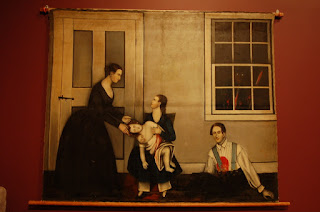THREE SKIPS AND A BEATING
“In order to procure the money that he needed to extricate himself from poverty, James Teed’s mother, who was the sister of Richard Jennings, agreed to release her interest in the fifty acre lot to him, that he might be at liberty to mortgage the same, to answer his necessities. Jennings understanding the plan that was agitated, interfered and prevailed upon his sister to withhold the release by his deceitful arts.” -The Report of the Trials of the Murderers of Richard Jennings
Although my father and mother said many times how their generation were the lucky ones, probably the last to know the small town wilds of Orange County, I could say the same thing. Progress has thankfully been slow in coming to this part of the country. Our 1950’s two story, white, colonial house (now painted a sky blue) is still there, but not much else has appeared on the horizon. Some of the open expanse of corn and hay fields is fouled by development, and many of the old homesteads were torn down or burned years ago, but for the most part, it is as it was in my great grandfather’s time; a bucolic backwater. Suburban development stalled in the 1970’s and has only recently resumed. Deer still roam the woods and turkeys roost again in the Mud Lane hemlocks. The shallow river remains languid, brown and maybe a little cleaner than it was in the 19th century.
My parents had a traditional lifestyle and marriage. The old man put a suit on in the morning, went to the office in Newburgh, and came home every night. My mom had dinner on the table and managed everything else. They both seemed comfortable with the lopsided arrangement. Maybe they were just susceptible to the chauvinist hypnosis of the times. Dad made a pretty good living as a stockbroker, and little else was expected of him. He got off easy. We were clothed by Sears and fed with the help of Swanson’s fish sticks. This modern family was part of that generation who could afford a new car every year, and had already taken out a loan on a bright future. By 1970 they’d done so well the family was ready to upgrade.
Offered a partnership in a regional brokerage firm, my father moved the Osterhouts to Simsbury, Connecticut. They took my grandmother with them. I always admired my father for breaking away from the extreme gravitational pull of Montgomery, and for taking along his wife’s mother…..until she was 103! Then, somehow, avoiding the old age home, my grandmother escaped to my sister Susan’s house, where at 105, she got sick on a Friday and died on a Monday. She set the bar very high for a long life well lived. I have her false teeth in the drawer—another precious family heirloom.
Like my father, Richard Jennings was a kindred spirit in his patrician dictates. He would take care of everything. Don’t worry. I’ve got it covered. The way he saw it, that 50 acres was all that stood between his sister and the poorhouse. It was her only security against the debt collectors. Step aside.
Dick lived with his kids; one-eyed Ira and Coe, the youngest. They remained in town and Dick moved in with them. Still, he acted like he was always the final word, the boss, not to be questioned. He had no desire to see his sister Phoebe cold and hungry under his worthless nephew’s roof. He knew that 50 acre property well. It was a good piece, near Nathaniel Knapp’s large farm, at the base of Sugar Loaf nob. Timber was there for the cutting, plenty of grass for the cows and good cornfields. It was wet in the spring, but dried up fast with good southern exposure. He could throw a coat of paint on the little house, and rent it out to some hard-working tenants. Hell, maybe he’d even let James rent it. Ha! Fat chance.
The plan was to take in his sister Phoebe in return for title to that property. She was already 70 years old, the same age as my grandmother when she moved in. How long could she last? The patriarch instructed Ira and Coe to build their aunt a small room off of their own kitchen. He’d buy the lumber. Here she could stay in comfort, living out the rest of her days. But he had to act fast. If Phoebe changed the deed, naming James as a current beneficiary, and it went through escrow before he interceded, the land could be lost forever….or at least as long as James could hold onto it. Dick sent one messenger with a note to his sister and another runner to the county clerk’s office. James realized the same urgency in the matter.
James Teed instructed his mother to sign; sliding the ink, quill and deed across the table. She sighed heavily, and complied. The script was still wet when James rolled up the deed and rushed it over to the Goshen clerk’s office, but it was already too late. Unbeknownst to James, only hours earlier, his mother had signed a different agreement with her brother. She just wanted to make everybody happy. She hoped James wouldn’t be too angry when he found out. Both of these documents would contradict each other and be the source of multiple law suits, and eventually murder. Phoebe Teed’s lousy estate planning crossed those loose wires jerking and sparking in her son’s brain, cranking up the amperage, lightning flashing in his eyes.

Comments
Post a Comment